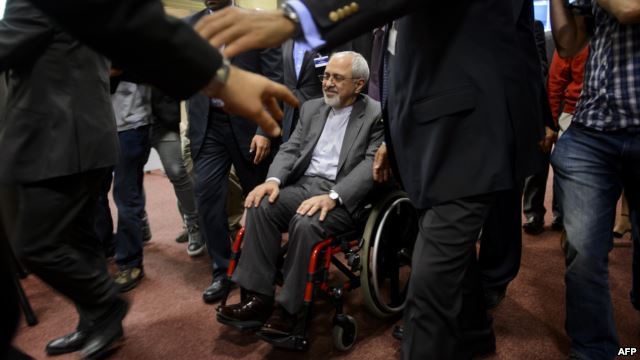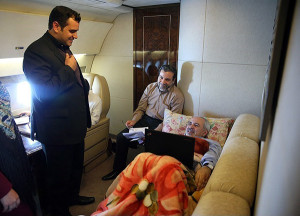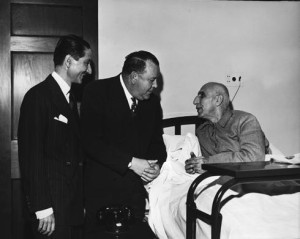Are we witnessing a double breakthrough: not only a US-Iran detente, but also a burying of the image of masculinity that has brought conflict rather than compromise for more than 60 years?
The negotiations over Iran’s nuclear programme held at Geneva last week have been almost universally hailed as a success. Diplomats from Tehran and the 5+1 Powers put out a cooperative tone that has raised the promise of genuine progress being made in future discussions.
Beyond the nuts-and-bolts of Tehran’s proposal — details of which are being closely guarded by the Iranian Foreign Ministry — one of the prevailing images of the Geneva talks was of Foreign Minister Mohammad Javad Zarif attending in a wheelchair.
According to Zarif, his back pain was caused by allegations made by hardliners that he had questioned the wisdom of President Rouhani’s historic telephone conversation with barack Obama last month. He said he was in such pain that he wasforced to spend most of the flight to Geneva lying down — a photograph showed him talking with his colleagues, covered by a blanket, laptop to hand.
The scenario of a high-level diplomat admitting to a severe injury before participating in international negotiations — and in particular the photograph of the Foreign Minister reclining on a sofa en route — brought to mind two leaders who may have sympathised with Zarif’s predicament: Mohammad Mossadegh and John F. Kennedy.
And those similarities may offer a perspective on changing attitudes towards gender and masculinity in diplomatic relations.
Prime Minister Mossadegh, who came to office in 1951 and was overthrown by a US-backed coup in 1953, suffered from poor health and often conducted meetings with foreign diplomats from his bed. When in New York to discuss the nationalization of Iran’s oil industry in 1951, Mossadegh was taken ill and had to recover in hospital.
In 1952, Time named Mossadegh as its “Man of the Year” — but this was far from a compliment. The magazine described Mossadegh as “an appalling caricature of a statesman”, often reduced “to the point of tears and fainting spells”.
Mossadegh’s ill health affected Iran’s domestic and foreign policies.
Historian Mary Ann Heiss suggests that US and British policymakers were predisposed to view the Prime Minister with antipathy in part because his persistent — whether feigned or real — illnesses, as well as his tendency to faint and weep during speeches, did not match up to Western ideals of masculinity.
According to Heiss, Mossadegh’s supposedly “feminine” traits, epitomised by his apparent physical and emotional fragility, contributed to the Eisenhower administration’s decision to authorise a CIA-instigated coup to topple the Prime Minister.
While Mossadegh did not fit the typical Western vision of masculinity, John F. Kennedy most certainly did. An avid enthusiast of sports who served heroically in the US Navy during World War II, JFK sought to project an image of the youthful, masculine, all-American politician. He even went so far as to ensure he was never photographed playing golf on the White House lawn as it was an old man’s game, instead preferring US football.
Little-known at the time, but well-documented since, were Kennedy’s chronic back problems. JFK, the paragon of vigor, suffered from numerous ailments and illnesses throughout his life.
For the historian Robert D. Dean, Kennedy’s fear of appearing “unmanly” led him to embrace an “ideology of masculinity” that shaped how his Administration envisaged and responded to threats at the height of the Cold War. In US relations with the Soviet Union, “toughness” was favoured, at least rhetorically, over compromise.
So Zarif’s predicament is far from new, but does it mark a change in the way we approach international relations?
The language of masculinity is still prevalent among those who argue that it is Washington’s tough sanctions policy that brought Tehran to the negotiating table.
However, in this post-Cold War moment of thawing US-Iranian relations, Western diplomats responded to Zarif’s present physical “frailty” not with the disdain that Mossadegh received, but with advice on how to alleviate his discomfort.
As one senior US administration official put it, “Everyone had a back story for him, books they thought he should read, things he might try, because we all have suffered.”
“There isn’t one among us who doesn’t have a back problem,” the official added.
Could it be that we are witnessing a double breakthrough: not only a US-Iran detente, but also a burying of the image of masculinity that has brought conflict rather than compromise for more than 60 years?
(Featured Photo: Foreign Minister Mohammad Javad Zarif leaving the Geneva talks)



